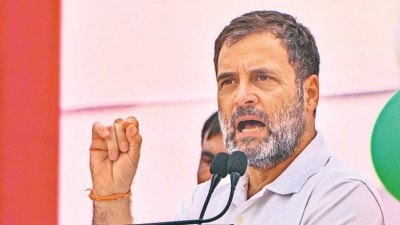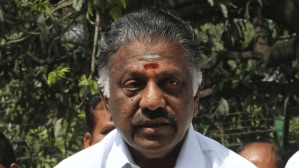Click here to join Express Pune WhatsApp channel and get a curated list of our stories
Why onion growers, farm leaders are demanding open procurement from markets?
Farmers in the onion growing zone of Nashik-Pune-Ahilyanagar (formerly Ahmednagar) districts of Maharashtra have mixed reactions towards farm gate procurement of onion.
 Bharat Dighole said the open procurement would help farmers as the current system of farm gate procurement by the Farmer Producer Companies (FPC) is not feasible. (Bharat Dighole X)
Bharat Dighole said the open procurement would help farmers as the current system of farm gate procurement by the Farmer Producer Companies (FPC) is not feasible. (Bharat Dighole X)On Monday, Bharat Dighole, president of the onion growers’ association of Maharashtra, demanded that the government procure onions from the open market and various schemes be floated to procure the bulb from the open market.
Dighole, who was addressing a meeting of onion growers, said this would help farmers as the current system of farm gate procurement by the Farmer Producer Companies (FPC) is not feasible. Dighole is not alone in this as many other farmers and farm leaders have made a similar demand. A look into the demand and why it has originated.
What is the present manner of procurement and who does the procurement?
In order to help farmers get a better price and ensure consumers are not stung by inflation in the prices of the bulb, agencies such as the National Cooperative Agricultural Marketing Federation (NAFED) and the National Consumers Cooperative Federation (NCCF) effect the procurement on behalf of the central government. On their part, the Farmer Producers Companies (FPC) Federation act as the sub agent of both NAFED and NCCF and buy onions from their member FPCs.
Individual farmers sell their onion at the farm gate which saves them transportation and other costs. Every day, before the start of the auction, the FPCs announce their prices for the day taking into consideration the various trade trends. Only produce which fits the quality criterion is purchased and payment is directly credited into the accounts of the farmers.
The FPCs collect land documents from the farmers to ensure only genuine growers sell their produce at the farm gate. This season, between the two agencies, the central government plans to produce 3 lakh tonne of onion in Nashik and other onion growing districts of the state.
Why are farmers now protesting this mechanism?
Farm gate procurement technically is supposed to help farmers. They save on transport cost to the wholesale markets and do not have to spend on excess levies and taxes that markets charge.
For the central agencies, this would guarantee that farmers are able to sell their produce and other players like traders or aggregators do not offload their produce on the sly.
But Dighole challenged the very suppositions on which decentralized procurement is based. Over the last few years, Dighole and other leaders said the FPC mechanism has become a den of corruption.
“During the last season, we saw federations mushroom all over the state. These federations are now managed by the political leaders who use these avenues to ensure their supporters manage to corner the government procurement,” he alleged. These federations, Dighole said, manipulated the prices and with the connivance of officials, try to pass off inferior quality of onion or even just carry out trade on paper and try to corner the money.
Anil Ghanwat, the president of Shetkari Sanghatana—the farmer’s union founded by the Sharad Joshi—had taken up the issue of corruption in onion procurement of last season. Ghanwat’s organisation had taken up the matter and had alleged that transactions were carried out on paper.
NAFED and NCCF had filed FIRs against multiple federations for corrupt practices in onion procurement of last season. A senior official from the Goa Marketing Federation was suspended for his alleged role in the scam. Multiple federations were blacklisted, and a total rehaul of the procurement process was announced.
What do farmers have to say on this?
Farmers in the onion growing zone of Nashik-Pune-Ahilyanagar (formerly Ahmednagar) districts of Maharashtra have mixed reactions towards farm gate procurement of onion.
Santosh Gorde, a farmer from Takli village in Niphad taluka of Nashik district, said he prefers that government agencies procure onion from the open markets. “If you see, the FPCs always quote less than market rates. This they justify by saying farmers are saving on their transport cost. But that really does not make sense,” he said.
Gorde said this year, while the average price of the bulb in the open market ranged between Rs 2,000 and Rs 2,100/quintal, the FPCs were charging between Rs 1,700-1,800/quintal.
“At the farm gate, the FPCs only procure the best of the lot. Suppose, I have around 100 quintals, only 30 per cent would be procured by the FPCs at the farm gates. The rest would have to be offloaded in the open market. It’s better if we offload the whole lot in the open markets,” he said.
But more than the logistics, it was the apparent lack of transparency in the whole process. “In many cases, the FPCs have failed to account for the loss in weight or the delay in payment,” he said. Gorde alleged that many of the FPCs have been used by traders and political leaders to offload produce rather than provide farmers an avenue to sell their produce.
What is the way forward?
Ghanwat said the best possible way to solve the problem would be for the government to never intervene in the onion markets. “The central government keeps a hawk’s eye on onion prices and tries to control prices through methods such as export ban or imports. Let the government exit from the markets completely. The market should be able to determine its price through the supply demand mechanism,” he said.
Click here to join Express Pune WhatsApp channel and get a curated list of our stories













